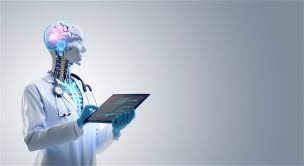The integration of Artificial Intelligence (AI) into the healthcare sector has ushered in a new era of innovation, significantly transforming the way medical professionals diagnose and treat patients. This article explores the profound impact of AI on healthcare, shedding light on the benefits, challenges, and future prospects in the realm of diagnosis and treatment.
Medical Imaging and Diagnostics
AI has demonstrated remarkable capabilities in the analysis of medical images, such as X-rays, MRIs, and CT scans. Machine learning algorithms can swiftly and accurately identify anomalies, assisting radiologists in making more precise and timely diagnoses.
Early Detection of Diseases
The ability of AI algorithms to analyze vast datasets allows for the early detection of diseases. From identifying subtle patterns in medical images to analyzing patient data, AI contributes to early intervention, potentially improving patient outcomes.
Personalized Treatment Plans
AI plays a pivotal role in the development of personalized treatment plans. By analyzing a patient’s genetic makeup, medical history, and other relevant data, AI algorithms can recommend targeted therapies, ensuring treatments are tailored to the individual characteristics of each patient.
Drug Discovery and Development
In drug discovery, AI expedites the identification of potential candidates by analyzing vast datasets and predicting their efficacy. This accelerates the drug development process, potentially leading to the discovery of novel treatments for various diseases.
Data Privacy and Security
The utilization of patient data for AI analysis raises concerns about data privacy and security. Ensuring compliance with stringent privacy regulations and implementing robust security measures is imperative to build trust in AI-driven healthcare systems.
Interoperability of Systems
The integration of AI into existing healthcare systems requires interoperability to ensure seamless communication between different platforms. Standardization efforts are essential to overcome challenges related to data sharing and system compatibility.
Education and Training for Healthcare Professionals
Addressing the barriers to AI adoption in healthcare involves providing education and training for healthcare professionals. Ensuring that clinicians are proficient in understanding and utilizing AI tools is crucial for successful integration.
Regulatory Frameworks
Developing clear regulatory frameworks is essential to guide the responsible deployment of AI in healthcare. Regulatory bodies play a crucial role in establishing standards, ensuring patient safety, and fostering innovation in the field.
AI-Integrated Virtual Health Assistants
The future of AI in healthcare includes the development of virtual health assistants that leverage AI to provide personalized health information, medication reminders, and real-time monitoring of vital signs.
Continuous Learning Algorithms
Advancements in AI will lead to the development of continuous learning algorithms. These algorithms can adapt and improve over time, refining their diagnostic and treatment capabilities based on ongoing data inputs.
Conclusion
Artificial Intelligence has emerged as a transformative force in healthcare, offering unprecedented capabilities in diagnosis and treatment. While challenges such as data privacy and system interoperability must be addressed, the potential benefits in terms of early detection, personalized treatment plans, and drug discovery are immense. As the integration of AI in healthcare continues to evolve, collaboration between healthcare professionals, technology developers, and regulatory bodies will be crucial to ensure that these innovations enhance patient care while adhering to ethical standards and patient privacy. The marriage of AI and healthcare holds the promise of a future where medical interventions are more precise, personalized, and effective, ultimately improving the overall well-being of individuals around the world.
